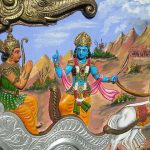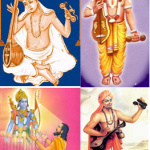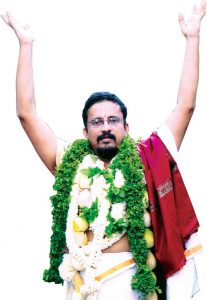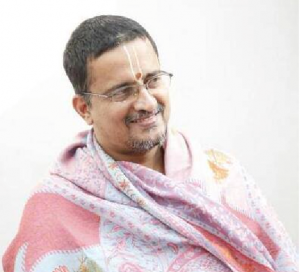Bhagavan Sri Ramana Maharshi, one of the most revered Indian saints of the twentieth century, is known for his advocation of the Advaitic path of Self Enquiry as a way to liberation. But there is another path that he gave equal importance and credibility to, and that is Surrender or Bhakti.
Bhagavan has often said, “There are two ways: ask yourself ‘Who am I?’ or submit.” By submit he meant submit or surrender oneself to the Divine will, which is the essence of Bhakti or devotion to the Lord. He has also often said, “Bhakti is the same as vichara (self enquiry).”*
Bhagavan advocated the path of surrender to many of his devotees. Arthur Osborne, in his biography of Bhagavan –Ramana Maharshi and the Path of SelfKnowledge – quotes Bhagavan as having said to one devotee, “Submit to me and I will strike down the mind,” and to another, “Your business is only to surrender and leave everything to me.”
In the same book, Osborne writes (about a devotee):
“Venkatraman grew uneasy after some time at being given no sadhana —that is no practice to perform — and complained.
‘And what brought you here?’ Sri Bhagavan asked.‘Thinking of you, Swami.’
‘Then that is also your sadhana. That is sufficient.’ And indeed, the thought or remembrance of Bhagavan began to accompany him everywhere, to become inseparable from him.”
Bhagavan also encouraged chanting of the Divine names of the Lord as japa or meditation. To a devotee’s question “Can advaita be realized by japa of holy names; say Rama, Krishna, etc.?” Sri Bhagavan answered categorically “Yes”.*
Many of Bhagavan’s devotees chanted Rama Nama and he always encouraged them to do so. He once explained the significance of the name Rama.
“The ‘Ra’ stands for the Self and ‘ma’ for the ego. As one goes on repeating ‘Rama’, ‘Rama’, the ‘ma’ disappears, getting merged in the ‘Ra’ and then ‘Ra’ alone remains. In that state there is no conscious effort at dhyana, but it is there, for dhyana is our real nature.”*
Not only did Bhagavan prescribe the path of bhakti to some of his devotees, but he himself was the greatest of bhaktas. Many of his Tamil compositions like the Aksharamanamalai (Marital Garland of Letters) ooze with devotion to Arunachala and the Supreme Self, thus standing testimony to the fact that supreme bhakti is inherent in a true Jnani.
Nisha Giri, Houston, TX






